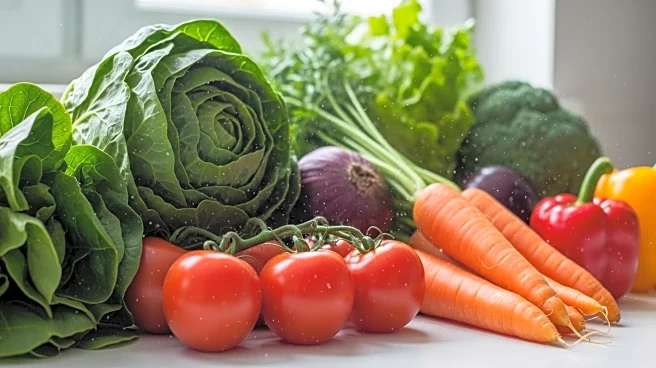What is the story about?
What's Happening?
A recent study conducted by researchers at the University of Plymouth has revealed that nanoplastics can penetrate vegetable tissues, raising significant concerns about food safety and human health. The study used radishes as a model to demonstrate that these tiny plastic particles, measuring as little as one millionth of a centimeter, can enter the roots and travel into the edible parts of the plant. The experiment involved exposing radishes to a solution of polystyrene nanoparticles tagged with radiolabeled carbon, and after five days, it was found that nearly 5% of the particles were absorbed by the plant. This discovery indicates that nanoplastics are not confined to root surfaces but can move throughout plant systems, potentially affecting various types of produce grown worldwide.
Why It's Important?
The findings of this study are significant as they highlight a new pathway for humans and animals to consume nanoplastics, extending beyond seafood and water sources. This emerging food safety concern could have widespread implications for agriculture and human health, as nanoplastics may be absorbed into various crops and passed on through the food chain. The study underscores the interconnectedness of the food chain, suggesting that crops absorbing nanoplastics could pass these particles to livestock, eventually reaching humans through multiple dietary routes. Given the difficulty in detecting and removing nanoplastics once inside biological tissues, this could lead to continuous exposure to these particles, posing potential health risks.
What's Next?
Future research is needed to explore whether different crops absorb nanoplastics at varying levels and to assess the implications for nutrition and health risks. Understanding these pathways is crucial to limiting exposure and protecting ecosystems and human health. The study calls for increased awareness and international policies to address plastic pollution and its hidden pathways. As plastic production continues to rise, addressing its long-term effects on food safety becomes increasingly urgent.
Beyond the Headlines
The study highlights the broader issue of plastic pollution, which is not confined to oceans and rivers but can infiltrate plants and affect human diets. This research builds on previous findings that plastic nanoparticles can accumulate in fish and shellfish, indicating that exposure could come from both seafood and plant-based diets. The University of Plymouth's research has influenced international policies on plastic pollution, emphasizing the need for continued efforts to understand and mitigate the impact of microplastics on the environment and human health.















